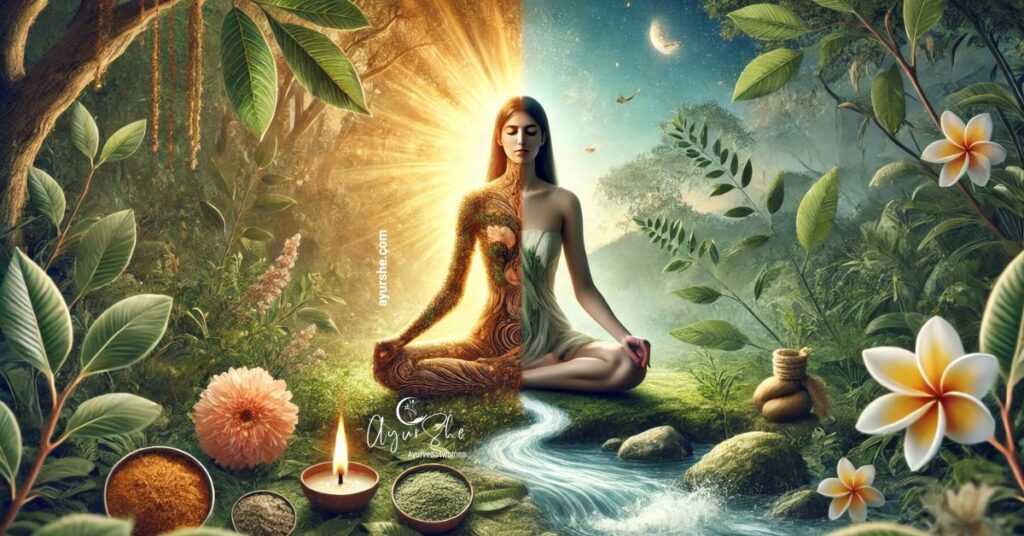Introduction
Modern women juggle multiple roles—professional, familial, and social. While rewarding, this multitasking often comes at the cost of mental health, leading to rising cases of anxiety and sleep disorders. Studies suggest that women are twice as likely as men to experience anxiety, and nearly one-third of women report chronic sleep disturbances, particularly during reproductive transitions (premenstrual, pregnancy, and post-menopause).
Modern medicine attributes these disorders to neurochemical imbalances, hormonal changes, and stress overload. Ayurveda, however, recognizes them as manifestations of Manovaha Srotas Dushti (disturbance in mental channels) and imbalances in Vata and Pitta doshas, leading to depletion of Ojas (vital energy).
This article explores the causes, correlations, and holistic management of anxiety and insomnia in women through both Ayurvedic and modern science lenses.
I. Anxiety and Sleep Disorders – Modern Science
🔎 Common Causes
- Hormonal fluctuations (menstrual cycle, perimenopause, pregnancy)
- Chronic stress and overwork
- Emotional trauma or depression
- Poor sleep hygiene, late-night screen use
- Caffeine, alcohol, or stimulant use
- Medical conditions: thyroid disorders, PCOS, diabetes
🩺 Symptoms
- Anxiety: Restlessness, racing thoughts, palpitations, sweating, irritability
- Sleep disorders: Difficulty falling asleep, frequent night waking, early awakening, non-restorative sleep
⚠️ Complications
- Impaired concentration and productivity
- Weakened immunity
- Cardiovascular risks (hypertension, arrhythmia)
- Hormonal imbalance → menstrual irregularities, infertility
- Increased risk of depression
II. Ayurveda’s Understanding of Anxiety and Insomnia
📖 Classical Knowledge
- Anxiety and restlessness = Chittodvega (mental agitation)
- Sleep disorders = Anidra or Nidranasha (insomnia)
⚖️ Dosha Involvement
- Vata aggravation → overactive nervous system, restlessness, dry insomnia
- Pitta aggravation → heated mind, irritability, waking at midnight (Pitta time)
- Kapha depletion → lack of heaviness required for sleep
🌀 Pathogenesis
- Irregular lifestyle → weak Agni → Ama accumulation
- Ama + Vata aggravation → disturbed Prana Vayu → imbalance in Manovaha Srotas
- Ojas depletion → poor resilience, emotional instability
III. Correlation: Modern & Ayurvedic View
| Modern Explanation | Ayurvedic Correlation |
|---|---|
| Neurotransmitter imbalance (low GABA, serotonin) | Vata vitiation, Ojas depletion |
| Cortisol elevation | Agni derangement, Pitta aggravation |
| Hormonal imbalance (estrogen, progesterone) | Rasa Dhatu & Manovaha Srotas dushti |
| Sleep cycle disruption (circadian rhythm) | Nidra upastambha vitiation |
| Stress-induced inflammation | Ama accumulation |
IV. Ayurvedic Management of Anxiety & Sleep Disorders
Ayurveda targets the root imbalance through dosha pacification, mind-body harmony, herbal remedies, diet, lifestyle, and Rasayana rejuvenation.
🌿 1. Herbal Remedies
(With Dosage and How to Use)
| Herb | Benefits | Dosage & Use |
|---|---|---|
| Ashwagandha (Withania somnifera) | Adaptogen, reduces cortisol, improves sleep | 3–5 g powder with warm milk at night |
| Brahmi (Bacopa monnieri) | Calms mind, enhances cognition | 250–500 mg capsule, twice daily |
| Shankhpushpi (Convolvulus pluricaulis) | Nervine tonic, reduces anxiety | 5–10 ml syrup or 1–2 g powder, twice daily |
| Jatamansi (Nardostachys jatamansi) | Promotes deep sleep, reduces restlessness | 1 g powder with honey at bedtime |
| Tagara (Valeriana wallichii) | Natural sedative, helps in insomnia | 250 mg capsule before sleep |
| Tulsi (Ocimum sanctum) | Reduces oxidative stress, emotional stability | Herbal tea 2–3 times daily |
🌿 2. Classical Formulations
- Saraswatarishta – for anxiety and memory, 15–20 ml with water twice daily
- Manasamitra Vatakam – for insomnia and anxiety, 1 tablet at night with milk
- Brahmi Ghrita – 1 tsp daily with warm water or milk
- Chyawanprash – 1 tsp in the morning for Ojas
🍽️ 3. Diet (Ahara) Recommendations
- Favor Vata- and Pitta-pacifying foods:
- Warm milk with nutmeg at bedtime
- Fresh fruits (banana, pomegranate)
- Vegetables (pumpkin, zucchini, carrots)
- Spices (cumin, fennel, cardamom)
- Avoid:
- Caffeine, alcohol, carbonated drinks
- Spicy, oily, and fried foods
- Heavy meals late at night
🧘 4. Lifestyle (Vihara)
- Dinacharya (daily routine):
- Fixed sleep-wake cycle
- Abhyanga (oil massage) with sesame or Brahmi oil before bath
- Evening relaxation rituals – candlelight, soft chanting, journaling
- Yoga Asanas:
- Balasana (Child’s Pose)
- Viparita Karani (Legs-up-the-wall)
- Shavasana (Corpse Pose)
- Pranayama:
- Nadi Shodhana (alternate nostril breathing)
- Bhramari (bee breathing) before sleep
🛀 5. Panchakarma Therapies
- Shirodhara (continuous pouring of oil on forehead) → deeply calming, improves sleep quality
- Nasya with Anu tailam or Brahmi ghee → clears mental stress
- Abhyanga + Swedana → reduces Vata, relaxes muscles
- Basti (enema) → for chronic Vata-related anxiety
🧪 6. Rasayana (Rejuvenation)
- Swarna Bhasma (under supervision) – enhances resilience
- Phala Ghrita – nourishes reproductive & mental tissues
- Medhya Rasayanas (Brahmi, Mandukaparni, Shankhpushpi) – improve mental clarity
V. Modern Medical Management
- Cognitive Behavioral Therapy (CBT) for anxiety & insomnia
- Pharmacotherapy (antidepressants, benzodiazepines, melatonin supplements)
- Sleep hygiene education – avoid blue light, maintain regular schedule
- Mindfulness-based stress reduction (MBSR)
VI. Integrative Approach
- Ayurveda provides long-term root correction, while modern medicine offers short-term symptom relief.
- Ashwagandha + CBT improves resilience better than either alone.
- Yoga + Sleep hygiene reduces dependence on sedatives.
- Herbal teas + melatonin can improve circadian regulation.
VII. Research Evidence
- Journal of Alternative Medicine (2012): Ashwagandha reduced cortisol and improved sleep in women.
- AYU Journal (2015): Brahmi improved anxiety scores significantly in clinical trials.
- Modern RCTs confirm yoga reduces GAD (generalized anxiety disorder) symptoms.
VIII. Serious Notes & Precautions
- Persistent insomnia >3 weeks should be medically evaluated.
- Anxiety with palpitations, breathlessness, or suicidal thoughts → urgent care.
- Ayurvedic medicines should not be mixed with sedatives without guidance.
- Pregnant and lactating women require individualized plans.
Conclusion
Anxiety and insomnia in women are not just lifestyle inconveniences—they are systemic imbalances affecting mind, hormones, immunity, and long-term health. Modern medicine views them through neurochemical pathways, while Ayurveda interprets them as Vata-Pitta disturbances with Ojas depletion.
Through herbal remedies, diet, yoga, Panchakarma, and Rasayana therapies, Ayurveda provides a sustainable, root-level solution. When integrated with modern approaches like CBT and mindfulness, women can achieve not only relief but lasting resilience, clarity, and restful sleep.
True wellness, as Ayurveda reminds us, begins with a calm mind and a deep, nourishing sleep.


